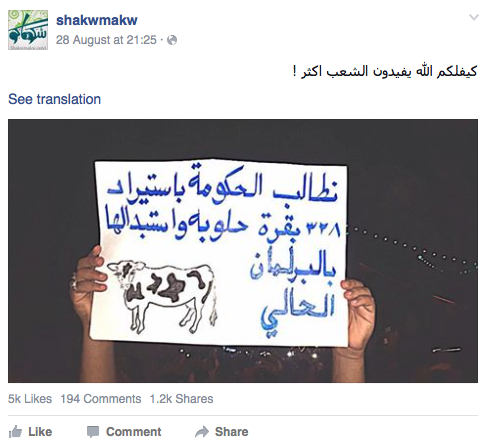
“We demand the gov't imports 328 dairy cows & replace the parliament with them,” tweets Hayder Al-Khoei, who shares this sign held at a recent protest in Iraq. The cows are more useful, he adds.
Iraqis have been taking to the streets of the capital Baghdad and other cities across the country every Friday for the sixth week in a row to protest against widespread government corruption and lack of basic services. It all started when Iraqis had enough from the frequent power cuts, as summer temperatures hit 50 degrees Celsius.
The demonstrations reached a peak on Friday the 28th of August after the call of religious Shiite cleric Moqtada al-Sadr to his followers to join the anti-corruption protests. This increase was promising, however less people showed up last Friday.
@HayderSH says he saw an ‘obvious decrease’ in number:
Obvious decrease in the number of protestors from the previous Fridays in today's protest at Tahrir. #Baghdad #Iraq
— Hayder Al-Shakeرi (@HayderSH) 4 september 2015
Reportedly, 15,000 people demonstrated on August 28 in the capital Baghdad, and many other cities across the country, mainly focused in the southern provinces. The protesters carried Iraqi flags and held banners with critical slogans towards corrupt officials and politicians, such as ‘where is our money?’. Some also carried lights with the word ‘civil’ written in it, demanding their basic civil rights.
Protests in Baghdad's Tahrir square this morning. #IraqWins pic.twitter.com/JvqbuB3J0y
— Ali Ajeena (@AliAjeena) 29 augustus 2015
#Iraq – Today's protests in Tahrir Square #Baghdad pic.twitter.com/2UjcyfG0eb — IraqiSuryani (@IraqiSuryani1) 28 augustus 2015
Protestors at Tahrir Sq. put lights written ” civil ” regarding to their demands ” civil country ” #Iraq #insm_iq pic.twitter.com/akdBaNuBAM
— Hayder Hamzoz (@Hamzoz) 28 augustus 2015
While the demands of the protesters began small, such as calling for improving the lack of electricity and clean water amid a heat wave of more than 50 degrees Celsius, they are now more complex. Protesters now urge Prime Minister Haider al-Abadi to carry out major measures. The first demands were given a enhancement when Shiite cleric Grand Ayatollah Ali al-Sistani called on August 7 for Al-Abadi to take measures against the political corruption.
As a response, the minister proposed a set of political reforms and measures, such as the elimination of several senior government positions, the end of sectarian quotas in politics, and the elimination of corruption.
PM Al-Abadi outlines new reform measures to enhance governance and tackle corruption; calls for backing from cabinet and parliament — Haider Al-Abadi (@HaiderAlAbadi) 9 augustus 2015
Council of Ministers unanimously backs PM Al-Abadi's first batch of proposed reform measures http://t.co/zGOEayG9bK pic.twitter.com/EXgfWe1pLr
— Haider Al-Abadi (@HaiderAlAbadi) 9 augustus 2015
However, he only fired three deputy prime ministers and a few ministers, and ordered security forces to ease access to Baghdad's Green Zone, leaving the protesters distrustful and even more determined. On August 28, the Prime Minister came with another set of measures to ensure “social justice”.
PM Al-Abadi issues a series of new measures to enhance social justice http://t.co/glKtsP362q http://t.co/RXXJTEqZ3i http://t.co/oSIscHWRdQ — Haider Al-Abadi (@HaiderAlAbadi) 28 augustus 2015
With several Shitte clerics urging their followers to join the demonstrations, the protests had gained more weight. In a televised speech on August 24, Al-Sadr’s spokesperson read a statement saying:
“We announce to all people and to the Sadrists in particular the need to participate in protests this Friday in Baghdad.”
“The Sadrist participants should merge with the other protesters in a single, national Iraqi crucible.”
Even though the call resulted in attracting more people to protest, some also questioned Al-Sadr’s support, pointing out his political role as the leader of the political party, the Sadrist Movement, and wondering why he is not changing the political system from the inside out.
Al-Sadr is asking his followers to participate in tomorrow's protests. Shouldn't he also ask his government officials to quit?#Iraq #Baghdad
— Hayder Al-Shakeرi (@HayderSH) 28 augustus 2015
The anti-corruption protesters got a lot of support on social media like Twitter and Facebook.
GO AND PROTEST FOR YOUR RIGHTS PEOPLE IN BAGHDAD !!! — nadia (@awhtomlinsons) 29 augustus 2015
In support of today's Iraqi mass protest in Baghdad Tahrir Square for jobs, provision of services and accountability. pic.twitter.com/Zil1BLEPoI
— Abdullah Muhsin (@Abdullah4NASUWT) 28 augustus 2015
#Baghdad anti-corruption protests. The will of these people is unshakeable. pic.twitter.com/6tAU4XFQ4S — Haidar Sumeri (@IraqiSecurity) 28 augustus 2015
Also the military, who has been instructed not to crackdown on the protests, showed support towards the demonstrators.
#Baghdad security forces continue to show exemplary virtue & the utmost respect for their fellow protesting citizens. pic.twitter.com/olpscC0RIN
— Haidar Sumeri (@IraqiSecurity) 28 augustus 2015
The anti-corruption movement has gotten Sunnis and Shiites together, with some people even calling for a complete political reform and the establishment of a secular state.
In Baghdad 1000s protest government corruption. No to Sunni government. No to Shia government. Yes to secular state! pic.twitter.com/9tybulNECO
— Ergin Kocyildirim (@kocyildirim) 29 augustus 2015






